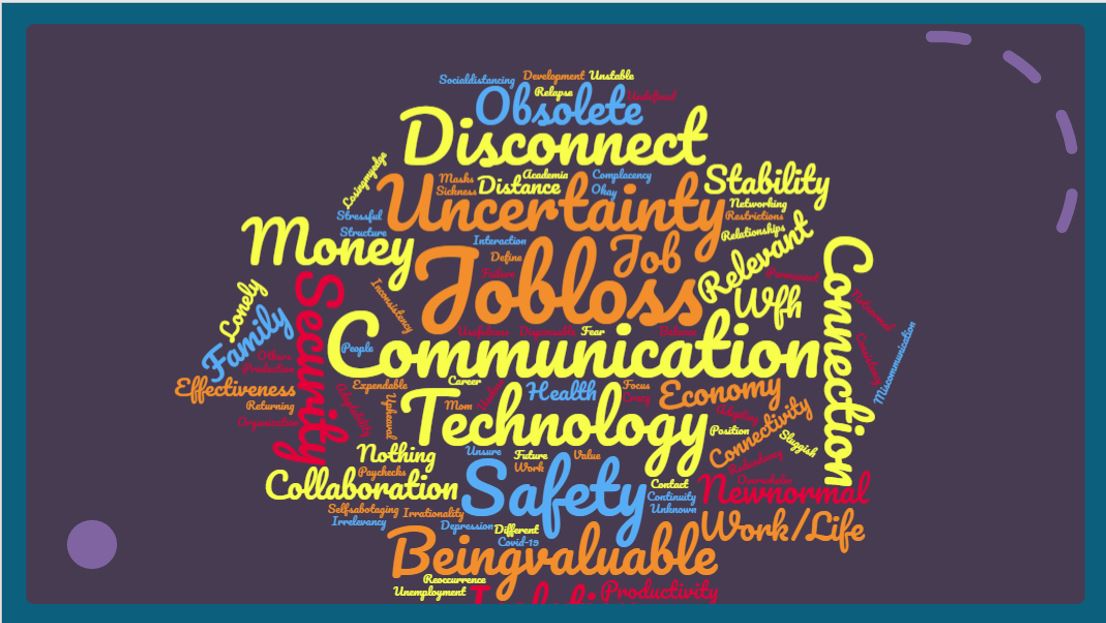
Bonnie Low Kramen shares some top tips for maintaining a strategic partnership in times of stress
The COVID-19 pandemic is a crisis that is, not surprisingly, causing high anxiety, distraction, and feelings of disorientation. After all, this virus is highly contagious, is worldwide, and causes death. People are worried about keeping their jobs, paying their bills, and getting sick. This is about as real as it gets. There are still more questions than we have answers to, with no real end in sight. An unprecedented recipe for a chaotic stress stew.
People handle extreme stress differently. Leaders are experiencing stress in their own ways, as are their teams. Some act out with short tempers. Others isolate and go radio silent. Still others get depressed and self-medicate with food, alcohol, or pills. The word cloud in this article reflects the answers given by Executive Assistants to the question “In one or two words, what are you worried about?”, since the pandemic began. The larger the letters means that word was a more frequent response. Different times call for new systems and new rules, even among leaders and assistants who have been working in partnership for a long time.
Case Study: Nate Berkus and Kelly Engstrom
On April 9th, celebrity interior designer Nate Berkus and his 9-year Director of Operations Kelly Engstrom were guests on a webinar hosted by Vickie Sokol Evans and me. They shared the story that their partnership was seriously tested in the summer of 2019 when they all left Los Angeles and moved to separate cities – Nate and his family to New York, and Kelly and her family to Cleveland. They made the point that despite their very close working partnership before the move, the remote aspect of their “new normal” was challenging in unexpected and negative ways.
Nate and Kelly revealed some trust issues which came out of simply not seeing one another every day. The situation escalated to having a need for a “clearing of the air” phone meeting.
Simply put, working remotely from home is not so easy. It is actually very hard given all the moving parts and the size of the team. It requires a change of mindset for all the players and that shift takes time. The idea that the world had to do it so suddenly added even more pressure and complexity.
Nate’s Advice for Executives
1. Transparency
Reveal the truth about what is going on. This demonstrates respect for your team, and it lowers the anxiety. The unknown is always worse than the known.
2. Vulnerability and Humanity
These are important strengths in working partnerships, not weaknesses. Be flexible and understanding when your team is hurting. Share your own feelings so that they are not a secret.
3. Clear Expectations
Don’t assume your team can intuit your priorities. That’s not fair or useful, especially in crisis or high-pressure situations.
4. Open Door
Give your team a voice to share opinions and ideas. Make it known that sharing these ideas are welcomed and expected.
Kelly’s Advice for Assistants
1. Err on the side of over-communicating
Both in written and verbal communication. Kelly was concerned that she didn’t want to “bother” Nate and at the same time, Nate was concerned over his need to know the status of certain projects.
2. Show Empathy and Kindness
Put yourself in your executive’s shoes to imagine what this must feel like for them.
3. New Rules/Boundaries for the New Normal
Given the realities of the crisis, such as children being home and out of school, decide together on a revised way of working.
4. Expectations
Assistants see and hear things that their executives do not see. Be clear about changing situations and how that impacts projects and plans.
The COVID-19 pandemic is a major test for leadership and for staff. Adversity reveals character. Just as we remember 9/11, we know that eventually, this too will pass. We are still in the thick of it now. When the worst is over and we get to look back, what we will remember is how this all feels. We can all play a part in protecting the human partnerships that matter in our lives.
Stay safe. Stay strong. Cut yourself and others a break. Be kind. Above all, let’s come out the other side whole and ready for the unknown future.











